Hillbilly Elegy, Let's Talk About It
My complicated feelings for trad wife book boyfriend JD Vance
As a novelist, I’m less interested in judging people and more interested in understanding how they tick, their motivations, childhood wounds, universal fantasies, and personality types. I’m intrigued by their “hero’s journeys,” or their “negative character arcs,” and descents into power or madness. It’s from this vantage point, and my own Appalachian heritage, that I examine JD Vance, author of the bestselling, controversial memoir Hillbilly Elegy, and now the 2024 Republican Vice Presidential nominee.
Also, thank you to everyone who voted in my reader poll last week. When I asked which piece you’d like to read next, the majority of you said, “Hillbilly Elegy, Let’s Talk About It,” so here we are.
Why I Give Two Shits About JD Vance
Once called “the most successful and important American under the age of 40,” JD Vance, now age 40, and his memoir are of particular interest to me for two main reasons. The first reason is because my own unpublished memoir, Kampala Sunsets, was compared to Hillbilly Elegy many times by people in the publishing industry. The literary agent representing me used Hillbilly Elegy as a “comparative title,” what they call in the industry “a comp,” when he was pitching my memoir to publishing companies, and as a fan of Hillbilly Elegy, at the time, I embraced the comparison. With the help of my agent, I even edited my book to be more like Vance’s. (Perhaps not the best approach in retrospect.)
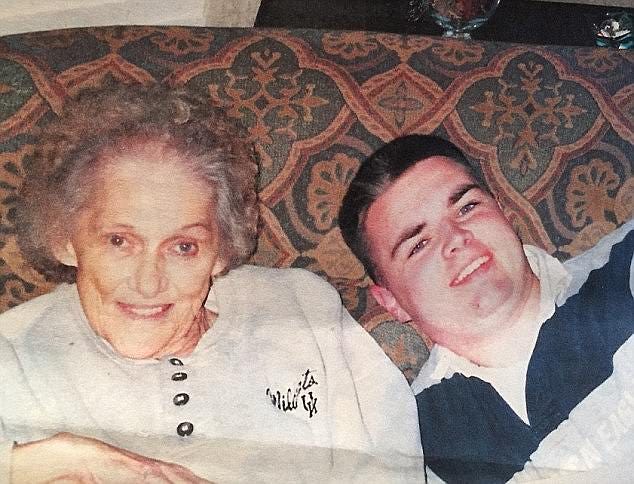
Vance and I are close in age, two years apart, and we both grew up in rural America with tough Appalachian Scotch-Irish grandmas in our lives. While my family life was less chaotic and far more affluent, neither of us really fit in anywhere. We both left our homeland, but continued to feel like outsiders, and both of us spent time in our early 20s working for the US Government overseas. We both also became disillusioned with the U.S. Government, and we both went to Haiti when we were young and impressionable, perhaps even at the same time, and were deeply affected by witnessing Haiti’s extreme poverty and political unrest. We both also had a loved one struggling with addiction, and both experienced domestic violence.
We also wrote our memoirs around the same age: 31; though mine is about growing up in rural western virginia and then marrying into and living amongst the 1% elite in Kampala, Uganda.
Besides relaying his personal story, Vance’s memoir deals with wondering why Appalachia is so poor, and my memoir’s side quest is questioning America’s relationship with Uganda/Sub-Saharan Africa.
Of course, while Vance’s book became a bestseller, my memoir remains unpublished, for too many reasons to explain here, and I’m certainly nowhere near as successful as Vance. However, due to these similarities, and our common cultural upbringing, I’ve probably got more sympathy for him and his book than most writers out there.
Plus, since I was using Vance as a comp, I kept following his work, his Twitter, and his rise. I’ve watched countless hours of his interviews and read his short-form writing. This may sound like torture to some, but I find it fascinating. I believe my writing benefited from reading his.
The second reason I’m interested is more universal—it’s just the caliber of his story. His character arc is dramatic, even more dramatic now than when Ron Howard made a movie about him. He’s gone from the poor Appalachian child of a single mother heroin addict to the Vice Presidential nominee of the United States, and that’s a hell of a trip to unpack. Not only that, but we aren’t sure if he’s on a hero’s journey or a villain’s descent into madness and destruction, perhaps even global destruction.
The sequel to Hillbilly Elegy is writing itself, but we don’t know what the ending will be.
Spittin’ on a penny don’t make it pretty
Since Vance’s nomination, Hillbilly Elegy skyrocketed again to the #1 bestselling book spot in the U.S. on all the charts, and the film adaptation reentered Netflix’s top 10 list. The story continues to captivate readers, no doubt in part because of how well it’s written, but also by how much controversy it’s generated.
But for every fan Vance has, there seem to be 10x more seething haters, and despite selling at least over three million copies since its release, Vance and his book have pissed off almost everyone, and many readers criticized him for furthering negative stereotypes. The West Virginia University Press even published a book in response, called Appalachian Reckoning: A Region Responds to Hillbilly Elegy.
Likewise, the traditional media, who once praised the work for uncovering unpopular truths about Appalachian culture, now reject Vance for crossing the political aisle and joining MAGA. The same voices who once praised Vance's raw, uncensored portrayal of his family and his own flaws, now excoriate him as a traitor, a shapeshifter, a “creepy cabbage patch doll,” and a man who has abandoned his roots for political gain.
Vance said that he never expected his book to become so popular or to be read by so many, and had he known, he wouldn’t have been so open and honest, or shared so much. He’s explained in interviews that he initially wrote the book to help himself understand his situation and to understand why the region has faired so poorly, as well as to tell the “true story of what a social, regional, and class decline feels like when you were born with it hanging around your neck.”
The Economist once wrote that, “You will not read a more important book about America, this year,” regarding Hillbilly Elegy, but now Amazon, Audible, and Goodreads have locked reviews to prevent non-readers from leaving one-star ratings. Despite roaring sales, his German publisher even dropped him, stating that they didn’t want to support his "demagogic, exclusionary policy."
Primary criticisms of the book fall into the following camps:
Vance isn’t hillbilly enough
Vance wasn’t/isn’t poor enough
Vance didn’t critique the system or systemic issues enough and put too much emphasis on individual responsibility.
Vance made people from Appalachia look bad.
Vance isn’t likeable.
Vance is the puppet of big tech gay Catholic Peter Theil.
Vance is too traumatized by his childhood to trust.
Close friends and other writers message me things about him like, “He sucks.” “He’s a cuck.” “He’s a retarded douche bag loser.” The opinions are so harsh, downright mean, that I have to wonder why he’s SO hated. Can we ever all get along? Scrolling my social media feeds, 99% of the public commentary about Vance is negative. Scathing. Angry. Very damning. Is this the price of being a “class traitor” a social climber or a devout Catholic in modern society? The cost of switching sides? Or, as the Wall Street Journal questioned, has "Vance Derangement Syndrome” already begun, less than a month into his nomination?
But I’m like, Vance is a unicorn. How many rednecks make it to the ivy league? Very, very few. I grew up in the region and I’ve never met a single one in real life. None of the kids at my high school went to an ivy league university, so far as I know, and my mom follows the whole town closely. Most didn’t go to college at all, not even to community college.
It also makes me wonder if Vance truly represents the voiceless? Because public support of him is like crickets right now, yet he got elected to the Senate. He got picked to be VP—many must like him? Right?
But where is this many? And who are they? Are they just not working in the media? Are they afraid to speak? Is this like one of those movies that gets a high audience score, but terrible critic reviews on Rotten Tomatoes?
Well, like Vance, and like any self-respecting person from Appalachia, I’m not afraid to speak my mind, and though I don’t agree with all his current political views or his party’s views, I’m also not willing to be dishonest about his book, his intelligence, or the sum of his ideas about America just because he’s no longer “playing for my team.”
Cruisin’ for a brusin’ with them fighting words
The more negative press I read, the more I find myself wanting to defend Vance. His book is one of the best memoirs I’ve ever read, and I re-read it this week, so I know it holds up.
Even if he had sex with a sofa, as detractors have plastered all over the internet, I honestly don’t care. Most American women have done at least one sex act with something for sale at Bed, Bath, and Beyond.
What I care about is Appalachia, and it’s suffering people, because that’s where I’m from, and IT’S STILL HAPPENING; Appalachia is in no better shape, so far as I can tell, than it was in 2016 when Hillbilly Elegy came out.
As the world gangs up on JD Vance, I feel some sort of redneck rage bubbling up inside me like black gold, and I’m starting to get PISSED, hillbilly-level pissed.
As Vance himself said recently in a speech, “We live in a society that is terrified to tell the truth…We are horrified of unconventional people who say and believe unconventional things [but] believing in crazy things is not the mark of why somebody should be rejected. Believing important truths should be the mark of whether we accept somebody… We need to be ok with non-conventional people.”
Vance is full of bold, uncommon, and conflicting ideas, some “weird,” some dangerous, and some smart, and he’s not afraid to share them in public or face the backlash from doing so. He accepts and embodies debate as a natural and necessary part of finding solutions amenable to as many people as possible. This is something I really appreciate, and it’s part of why I appreciated his book so much.
His short essays are also beautiful, like this essay on his changing religious views. In the piece he wrote,
“…the truth is that I discarded [my faith in God] it for the simplest of reasons: the madness of crowds. Much of my new atheism came down to a desire for social acceptance among American elites. I spent so much of my time around a different type of people with a different set of priorities that I couldn’t help but absorb some of their preferences. I became interested in secularism just as my attention turned to my separation from the Marines and my impending transition to college. I knew how the educated tended to feel about religion: at best, provincial and stupid; at worst, evil. Echoing Hitchens, I began to think and then eventually to say things like: “The Christian cosmos is more like North Korea than America, and I know where I’d like to live.” I was fitting in to my new caste, in deed and emotion. I am embarrassed to admit this, but the truth often reflects poorly on its subject.
And if I can say something in my defense: it wasn’t exactly conscious.
Has the opposite of this passage happened now? Disillusioned by the elites, he’s turned away and been absorbed by theocratic fascists within the alt right?
Regardless, he’s obviously a deep thinker, and an intellectual interested in philosophy and religion, with more in common with Obama, Mary Karr, and Andrew Yang than Donald Trump. His evangelical upbringing, affection for Lord of the Rings, and his constant mamaw stories give him a non-autistic Sheldon Cooper vibe, which is maybe why the Democrats keep saying he’s “weird.”
The best place to find something is where you lost it.
I distinctly remember the first time I choked up while listening to the audiobook version of Hillbilly Elegy, narrated by the author, back in 2016. I was tidying up my guest bedroom/home office in Toronto, where I was living and working at the time for the U.S. Government, also in my early 30s, because Vance and I are only two years apart in age. In a familiar twang, like I was listening to a friend from back home, he described the life and struggles of his grandmother, dealing with her alcoholic husband, talking about his mother bouncing around from bad to worse boyfriends, the visual decline of his neighborhood, and sharing stories about the addiction and poverty that plagued his peer’s families, the lack of ambition in the culture, the engrained sexism, and the despair, and suddenly, I found myself overcome with emotion and in tears.

One impacting passage was his words on Appalachian misogyny, something I’d experienced firsthand. In the book he notes his mamaw saying that “women were just shit on all the time,” then describes how the hillbilly culture “blended a robust sense of honor, devotion of family, and a bizarre sexism into a sometimes explosive mix.”
The mix of his family’s stories and his analysis of them made me feel seen in a way I never had before, my childhood homeland reframed through a lens both familiar and revelatory. Vance's words helped me realize how I'd let the cultural environment around me harm my self-esteem and drive me down an escapist, despair-tinted, alcoholic path, negatively affecting my entire life up to that point. He also made me proud to say I’m from Appalachia.
I recommended Vance’s book to everyone, and his success pushed me to try and publish my own memoir, which, as I was tidying up that day, sat finished, but untouched, printed out in a box in my closet.
I understood his inner conflict because it was also my own.
I'm not alone in this reaction. You can go on TikTok right now and watch others from Kentucky, Tennessee, West Virginia, Western Virginia, and North Carolina saying the exact same things, with tears in their eyes, after reading his book or watching the movie adaptation.
I'd honestly never felt so much kinship reading any other memoir, and I realized I'd never read another book set where I'd grown up. In fact, I'd never read another book by an Appalachian author so far as I knew.
My father once got very angry when someone called me a “hillbilly hippie” in a podcast. He was incensed because he said we were “valley people” and not “hill people,” but I saw no difference, and also reminded him that we literally lived on the side of a hill. To me, since Hillbilly Elegy, all the stigma of being a country bumpkin, a redneck, or a hillbilly is gone.
Granted, my childhood was far “better” than his, my family was far more affluent, and my parents never divorced, yet, like him, I still couldn’t escape the culture I grew up in, both the good and the bad of it, and I imagine many readers feel the same.
Hillbilly Elegy isn’t one sided or condemning of Appalachian people, as some critics would have you believe; it’s nuanced, poetic, and profound. I found myself tearing up multiple times again. It’s about systemic issues AND personal responsibility, and it’s full of Vance’s own internal conflicts and ideological shifts.
If wishes were horses, we’d all have a ride
Upon re-reading the book this week, I can attest that this is not a simple story of a bootstrappin’ lucky hillbilly, nor is it a straightforward critique of Appalachian culture or American economic policy. It’s an attempt to grapple with the complexities of identity, the power of narrative, and how our personal stories intersect with broader cultural and political movements. It's about wanting to belong, but never belonging, about the allure of simple narratives and the messiness of reality.
My favorite part of Hillbilly Elegy isn’t the spectacle of Vance’s wrecked childhood, his mother’s heroin addiction, his rise against all odds, or his economic analysis of the departure of manufacturing from the Rust Belt, it’s how he demystified the elite culture of Yale.
He explains why he aimed higher than most, and what he learned from his mentor, controversial figure Amy Chua, author of Tiger Mom, The Triple Package, Political Tribes, and World on Fire, while at Yale, and what she taught him about backdoor deals and elite network culture.
The book is full of useful advice for young adults, and I wished to God I’d read it when I was in high school, because those were dark times and maybe Hillbilly Elegy would have helped me see the way out. I honestly think every 10th grader in America should read and debate it, a great bookclub pick to argue about if there ever was one.

Chua was also responsible for connecting him to his literary agent, Tina Bennett, who represented both Chua and Vance, as well as Atul Gawande, Malcolm Gladwell, Matthew Walker, the author of Sea Biscuit, and big names in non-fiction. The latter half of Hillbilly Elegy illuminates the hidden paths to success that most people in America never experience.
Lay down with dogs, wake up with fleas
We can’t know exactly why Trump chose Vance as his running mate, but I suspect one reason was his name recognition amongst middle-aged white women, like me, a key demographic for Trump.
I like to joke that “Karen’s control this election,” and they already know Vance. For every woman who hated him after his cat lady comments, there is another who remembers how his story made them feel. Women love a good book boyfriend or a solid hallmark movie, and Vance has both on offer. In fact, he is the ideal trad wife book boyfriend—well educated, wealthy, over six feet tall, blue eyes, finance guy—literally the TikTok Genz girl 42 million views meme song, minus the trust fund, though he likely has one now for his kids. He’s a family man, devoted, but down to earth, bookish but also masculine, the kind of father who could recite Thoreau while smoking a brisket. He’s what a lot of women want.
Furthermore, if anything, Hillbilly Elegy shows how much books still matter to American culture, but, as I watch the drama unfold around Vance, and hear his super-catholic, conservative rhetoric, I find myself more and more torn.
I wonder if Vance is just like many of the men in my life who got red-pilled by social media, MAGA, and the alt-right/men’s rights movements, or if he is just a catholic person with a good heart who wants to do good for America, but believes traditional conservatism/pronatalism is the best method to achieve prosperity and peace?
In various interviews, and most recently on the Full Send podcast, he’s stated that he changed his mind about Trump because he realized the media made up fake narratives about the former president, because he’s anti-war, and because he thought Trump did a good job as president.
As to trans rights, he’s explained his concerns related to sports, children, and education, clarifying that it’s not because he doesn’t love and accept LGBTQ people, but because he wants fairness in sports, thinks there hasn’t been enough research into the longterm effects of hormone therapy on children, and because American kids are already falling behind on math and science, so he doesn’t think time during the school day should be given to gender studies.
He sees gender and sexuality as a far less important and contentious subject to be teaching in schools, and one that most American parents don’t want taught in public school. While many disagree, these aren’t particularly extreme viewpoints for Republicans or Catholics. Many in his party are much further right.
In a 2017 email to a self-described “gender queer radical pragmatist” friend from Yale, Sofia Nelson, who now identifies as trans, Vance wrote, “I think the trans thing with kids is so unstudied that it amounts to a form of experimentation… the left’s cultural progressivism is making it harder for normal people to live their lives.”
He also emailed the same friend saying, “I hate the police,” yet now he’s up on Trump’s pulpit fist pumping to crowds chanting “back the blue.”
Don’t put all your eggs in one basket.

The media also accuses Vance of being “backwards” and “wanting to take people back in time,” but he’s got Elon Musk on speed dial and the companies his venture capital firm invested in are forward-thinking.
Backed to the tune of $93 million dollars, by big name tech overlords, Peter Thiel, Marc Andreessen, Eric Schmidt and Scott Dorsey, the mission of Vance’s VC firm Narya is to fix America’s problems by focusing on “using technology and science to solve for the future.“ He named the firm Narya, after the “Ring of Fire,” one of the three power rings originally made for the Elves, the ruling class of the LOTR kingdom. According to the LOTR Fandom, the Narya ring had the power to inspire others to resist tyranny, domination, and despair.
Though Vance exited the firm to be a Senator, these are the businesses he was betting his farm on:
Kriya Therapeutics: Single dose gene therapies for common issues pertaining to neurological disorders, metabolic disorders, and eye problems
True Anomaly: Space security and militarizing the space force
AmplifyBio: MRNA vaccine development and platform development for new drug discoveries. “AmplifyBio will advance the quality of human health and save lives by creating next-generation platforms, tools, and services to amplify and accelerate the development of therapies and vaccines”
Value Base: A company automating property valuation for government and banks
Strivefund: Vivek Ramaswamay’s asset management company
Branch: The Carvana app of insurance companies
Chapter: Digital company helping seniors navigate Medicare
Acretrader: Company that lets venture capitalists invest in portfolios of farmland and orchards
Automic industries: Ai powered manufacturing solutions “to create a world where the world of atoms can move at the speed of bits”
Rumble: Canadian video streaming platform fighting cancel culture
Hallow: the number #1 prayer app in the App Store
We also know he’s open to magical thinking and mystical ideologies that others may see as crazy. He believes in the devil, angels, saints, and demonic forces, saying in a speech in 2021, “I believe the devil is real and that he works terrible things in our society.”
He’s talked about hanging out with Curtis Yarvin, a Dark Enlightenment thinker and pro-monarchist known for mapping Americans onto Tolkien fantasy roles. One writer said Vance’s nomination marks the ascent of the “Fantasy Generation,” the “generation that came of age in the early 2000s amid the “Lord of the Rings” film franchise based on the books by J.R.R. Tolkien.”
However, he’s got great presidential credentials, and he’s arguably a more well-rounded candidate than many. He understands rural America and the working class, but he also understands the coastal elites, with friends in high and low places, having lived in the Rust Belt and San Francisco. He’s worked overseas and in the senate, understanding war and navigating both the military and the government. He’s got a background in law AND business, and has insider understanding of Silicon Valley and the tech sector. He’s managed teams, and he’s received a degree from Yale Law School, no small feat, which also means his LSAT score was in the top 95%. Finally, he can write one hell of a book, and he’s practiced public speaking for thousands of hours in front of TV cameras and microphones. Few can boast this diversified a resume.
Don’t lock the barn door after the horse has bolted.
In conclusion, on one hand, I still feel that surge of recognition and gratitude for the book that made me feel seen—Hillbilly Elegy. On the other, I question Vance's political evolution, his alignment with far right talking points, and the complex web of ideas he represents, especially ones that seem sexist, when his book felt like a celebration of his strong Appalachian grandma, and he even told Megyn Kelly in an interview that, “the through line of my life is that there have been strong women who have made it possible for me to have a good life.”
He once criticized the concept of masculinity in Appalachia and wrote about how gender stereotypes have prevented Appalachian men from wanting to achieve more, from wanting to go into higher education, and from wanting to participate in the knowledge economy, as pursuits like reading and writing were coded as feminine or “gay.” He even questioned his own sexuality as a teen, until his mamaw set him straight by asking him if he wanted to suck dicks, to which he replied no, but now he talks about revitalizing traditional masculinity and preventing women from getting abortions, even in cases of sexual assault.
His own mentor and another strong woman in his life, his adopted Tiger Mom, Amy Chua believed Vance has what she calls “The Triple Package,” a mix of exceptionalism, exclusion, and excellent impulse control that is necessary to create explosive success and ambition; but by definition, to be driven, something must be missing, something must be driving you, and we must continue to wonder what is driving Mr. Vance towards the White House.
It’s hard to recognize him these days compared to the man who wrote in 2011, “Of all the things I can’t stand about politics, the tendency to emotionalize a difficult topic is probably the worst.”1
Given how many times he presented himself as anti-MAGA in the past, I question if he’s not a Trojan Horse, using Trump’s popularity to project himself into a position where he feels he can truly create an impact, where he can finally be so useful that Americans will have no choice but to love him like his own father never did.
After all, Vance admitted in his memoir to lying or concealing his true identity in order to fit in or protect his family members. He lied to his mom’s boyfriends about his likes and dislikes, so they’d like him. He lied to a lady at a gas station about going to Yale, so she’d like him, and he lied in court about his mom’s domestic abuse, to protect his mother from jail. He also helped his mother fake a piss test, at his mamaw’s urging. He’s undoubtedly an ends-justifies-the-means type, and he could be lying about his political views to further his own agenda now. We don’t know.
It’s from this place of conflict and questioning of intent, with one foot in the rolling hills of Appalachia, and the other tentatively placed in the broader political landscape, that I conclude this essay.
There is so much more that could be said, but if you’ve made it this far, I’d like to hear from you, whether you think Vance is a satanic piglet sent to destroy the world, or a good choice, let me know.
Now You
If you read Hillbilly Elegy, what did you think about it?
What comes to mind after reading this?
How do you think the real life sequel to Hillbilly Elegy will end?
Why do so many people hate JD Vance SO much?
If don’t have time to read Hillbilly Elegy, or don’t want to give money to the author, but want to get the gist, Vance’s Ted Talk makes similar points and summarizes parts of his book and ideology.
Also, if you see any errors in this piece, please let me know.
P.S. — MABAM
I rate every book I read with my own “Mind-Altering Book Award Medallions” AKA MABAM rating, that's a non-hierarchal book review system I invented with the artist Michelle Kosak.
This is my rating for Hillbilly Elegy:
On the left from up to down:
Heroic Dose: A book that rattles you to your core, transforms you, a masterpiece.
Heart Opener: Joy-filled moments that warm your heart.
Hit’s Fast: The page-turner. The non-stop fast read you can speed through.
On the right from up to down:
MindFluk: It messes with you, drops you into mixed emotions, has elements you feel torn about.
Cry It Out: You cried while reading. Yep, you cried.
And if you’d like to use my MABAM system to review books, you can download the png files here, and please tag or mention me if you do!
Thanks!
From http://frumforum.com/entry/whats-at-stake-in-ryans-budget where Vance wrote under the name J.D. Hamel.





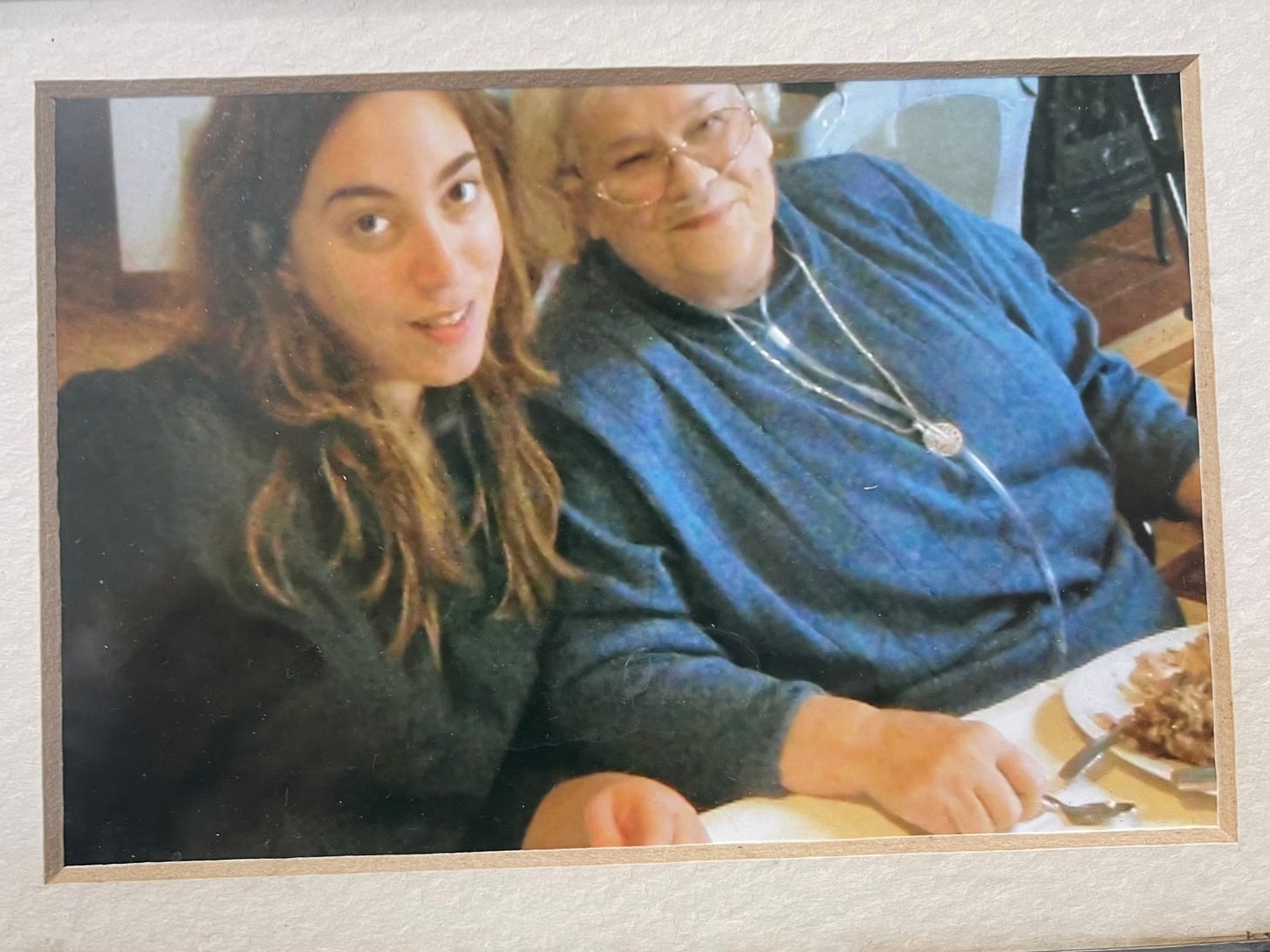
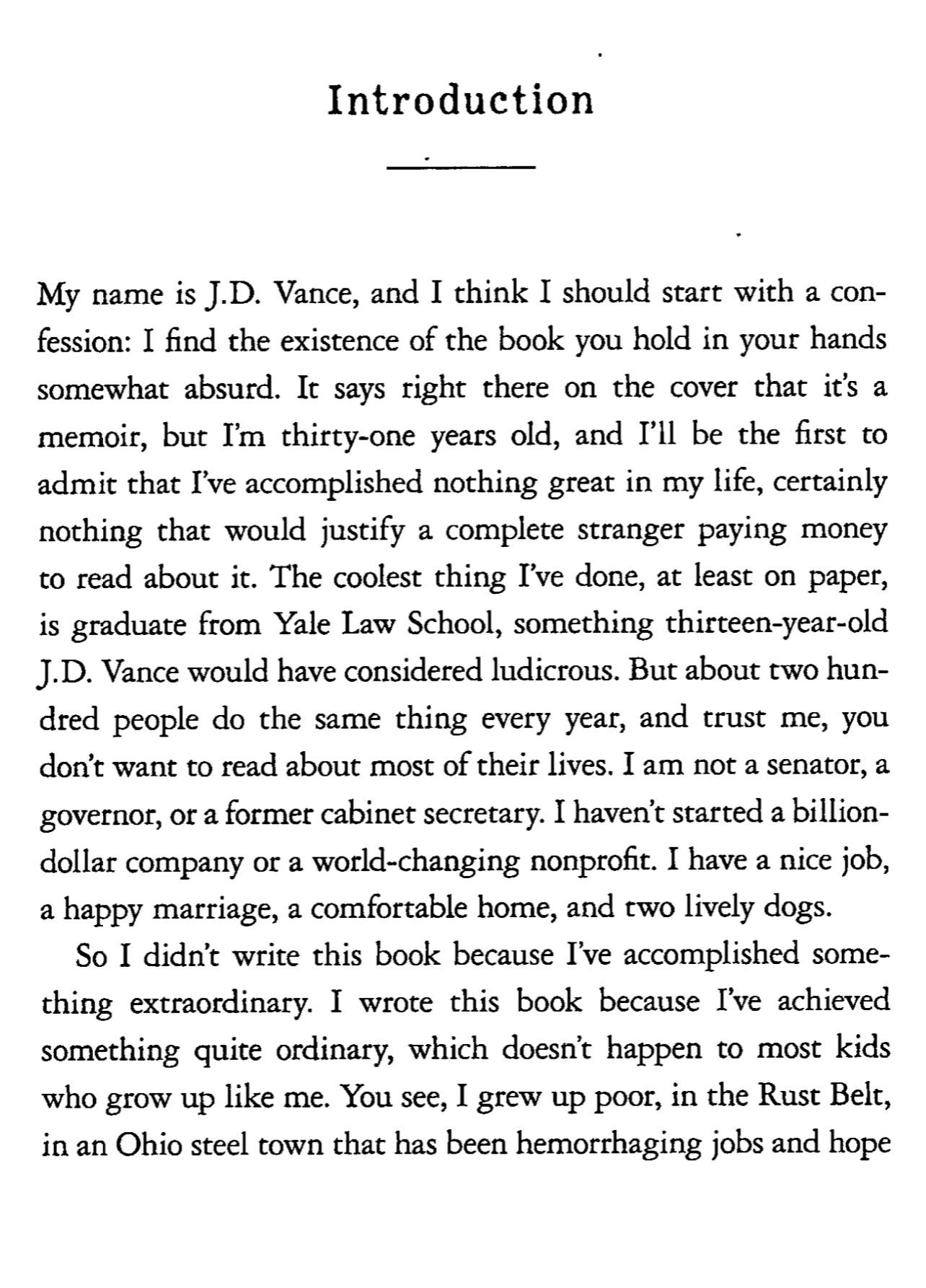
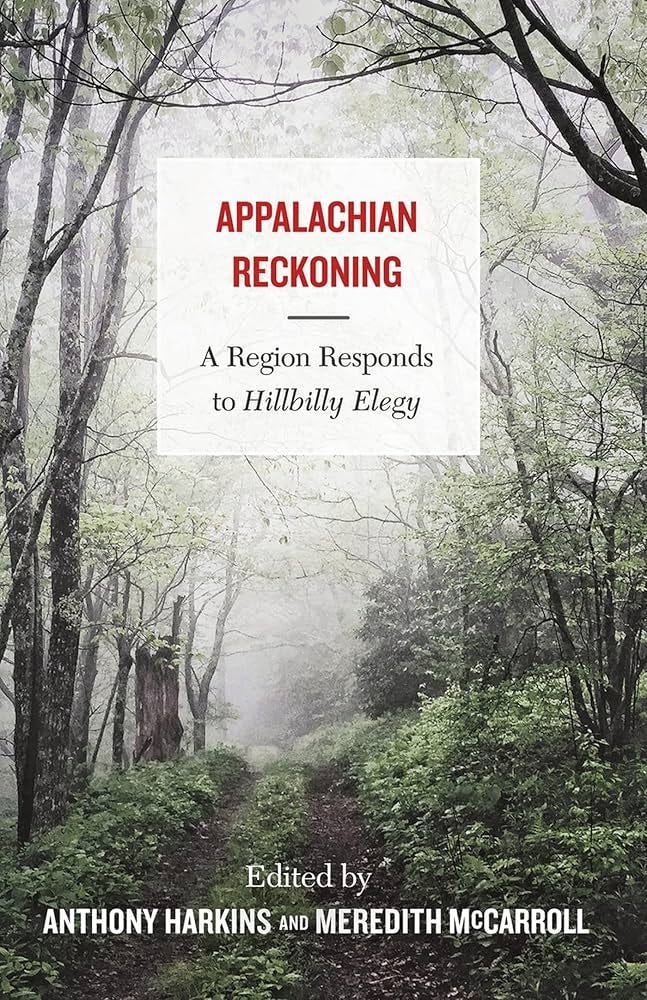
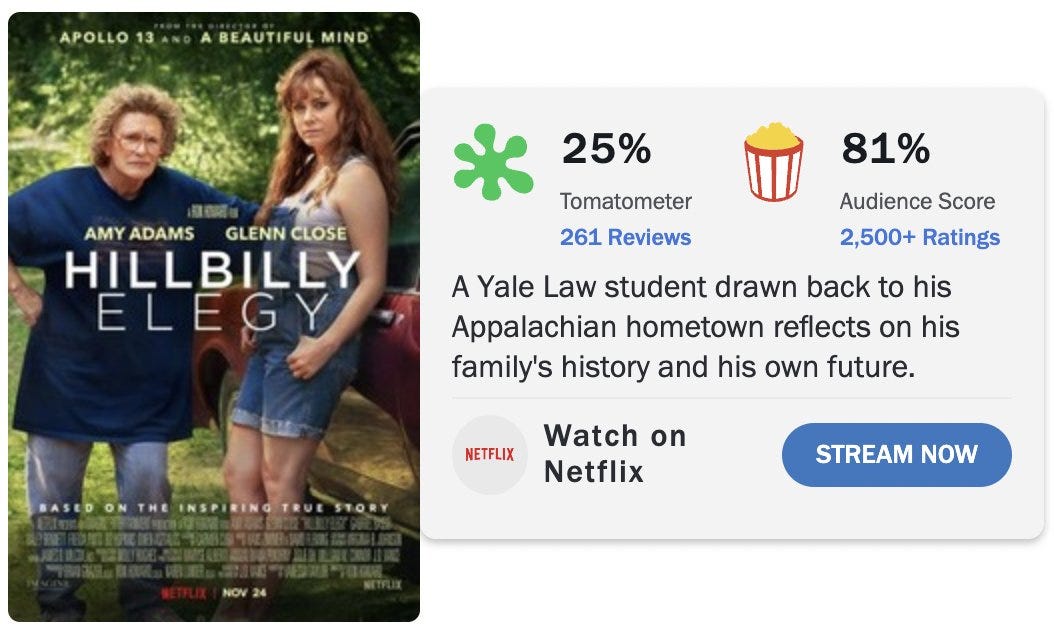


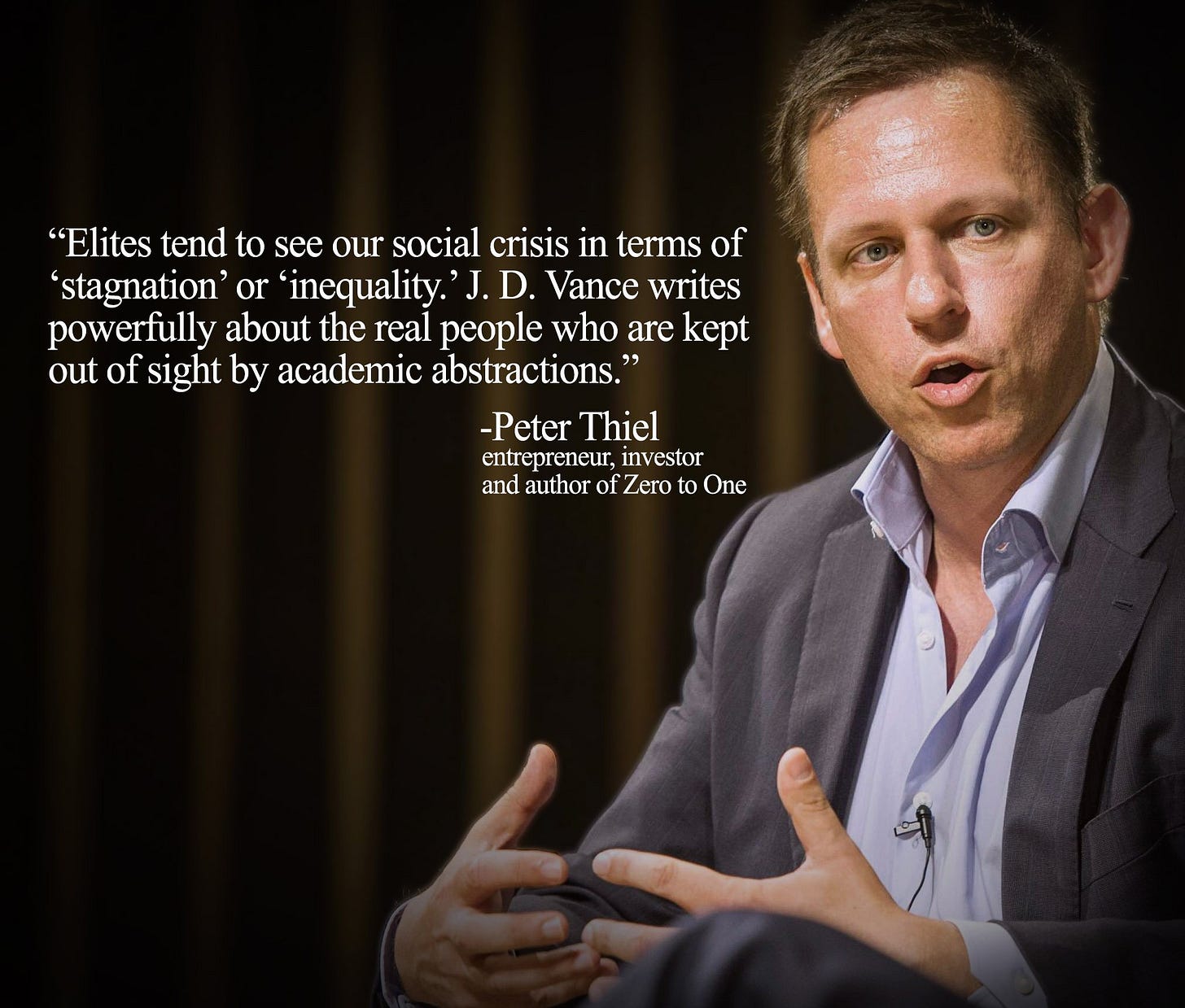

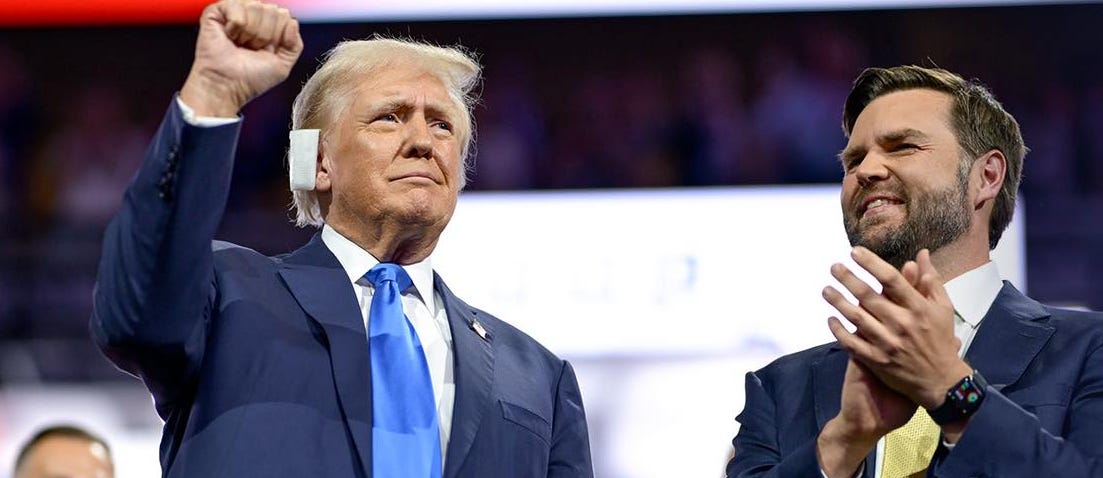

I knew very little about him so it's nice to learn about him in a non-partisan way. The thing about reading being 'gay' reminds me of the Bill Hicks routine when the waitress asks him 'Why are you reading?' Not what, but why?
Good piece, Charlotte. Thanks for sharing this with me.
I never read Hillbilly Elegy, though I had hoped to at one point. I appreciate your take on Vance. I find him objectionable, at least this current incarnation of his persona. But I agree that people are complicated, and I don't know what's in his heart or mind. I'm opposed to the MAGA agenda, so his alignment with Donald Trump is disqualifying.
But I believe your critique of the book and your essay compels me to read it. We need to keep our minds open; you do an excellent job here. Thanks for making me think. And thanks for linking this to Shelby's photography. From the Heads of the Hollers is an incredible book. Shelby's story is similar: he grew up in Appalachia and now lives on the East Coast.
I look forward to reading more of your essays. Will we see your memoir published anytime soon?